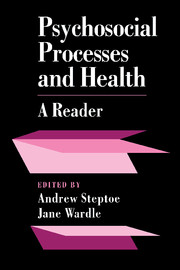Book contents
- Frontmatter
- Contents
- Preface
- Section 1 Life stress, social support and health
- Section 2 Psychophysiological processes in disease
- Pain mechanisms: a new theory
- Effects of coping behavior on gastric lesions in rats as a function of the complexity of coping tasks
- Social stress and atherosclerosis in normocholesterolemic monkeys
- Mental stress and the induction of silent myocardial ischemia in patients with coronary artery disease
- Depressed lymphocyte function after bereavement
- Psychological stress and susceptibility to the common cold
- Section 3 Personality, behaviour patterns and health
- Section 4 Health practices and the modification of health risk behaviour
- Section 5 Coping with illness and disability
- Section 6 Behavioural interventions in medicine
- Index
Effects of coping behavior on gastric lesions in rats as a function of the complexity of coping tasks
from Section 2 - Psychophysiological processes in disease
Published online by Cambridge University Press: 05 August 2016
- Frontmatter
- Contents
- Preface
- Section 1 Life stress, social support and health
- Section 2 Psychophysiological processes in disease
- Pain mechanisms: a new theory
- Effects of coping behavior on gastric lesions in rats as a function of the complexity of coping tasks
- Social stress and atherosclerosis in normocholesterolemic monkeys
- Mental stress and the induction of silent myocardial ischemia in patients with coronary artery disease
- Depressed lymphocyte function after bereavement
- Psychological stress and susceptibility to the common cold
- Section 3 Personality, behaviour patterns and health
- Section 4 Health practices and the modification of health risk behaviour
- Section 5 Coping with illness and disability
- Section 6 Behavioural interventions in medicine
- Index
Summary
Abstract
TSUDA, A., M. TANAKA, T. NISHIKAWA AND H. HIRAI. Effects of coping behavior on gastric lesions in rats as a function of the complexity of coping tasks. PHYSIOL BEHAV 30(5) 805-808,1983—In fixed ratio (FR) 2 coping task condition, experimental rats which could avoid and/or escape shock by emitting a disk-pulling operant response developed less stomach ulceration than did yoked “helpless” rats which had exactly the same shock but which had no control over shock. In variable ratio (VR) 5 coping task condition, however, the experimental rats developed more lesions than did the matched yoked rats. Neither the VR 2- nor the FR 5-experimental group was significantly different from its yoked group. Ulceration of non-shock control group was negligible compared to experimental and yoked rats in each of the four coping task conditions. The level of complexity or difficulty of coping response tasks required has a detrimental effect on ulcerogenesis for “coping” experimental rats. The effectiveness of a coping behavior covaries with the nature or ease of the coping tasks in a stressful situation.
Coping behavior Coping task Controllability Helplessness Gastric lesions
Weiss [13] has demonstrated that although being able to acquire a simple avoidance/escape response to turn off shock reduces the development of gastric ulceration for “coping” rats when the coping task is simple, Reprinted from Physiology and Behavior, 30, Tsuda, A., Tanaka, N., Nishikawa, T. and Hirai, H. Effects of coping behavior on gastric lesions in rats as a function of the complexity of coping tasks, 805-8. Copyright (1983), with kind permission from Pergamon Press Ltd, Headington Hill Hall, Oxford OX3 0BW, UK. ulceration is exacerbated if the coping task involves conflict. Tsuda and Hirai [10] have also reported that by changing the values of a fixed ratio (FR) schedule for the coping tasks, it is possible to reverse the normally beneficial effects of having control over shock.
Research to date suggests that gastric ulcer severity may be etiologically related to the two factors of controllability of shock and the coping tasks required to cope with it [8]. However, because very few studies have manipulated the complexity or difficulty of the coping tasks, the extent to which the beneficial effects of controllability are compounded by the degree of coping task complexity or difficulty is not clear.
- Type
- Chapter
- Information
- Psychosocial Processes and HealthA Reader, pp. 132 - 140Publisher: Cambridge University PressPrint publication year: 1994



